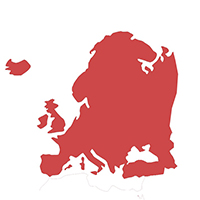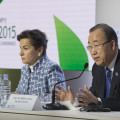COP21: We Have a Deal
admin | December 12, 2015.
The world has a climate agreement – a legally binding, somewhat ambitious, global pledge to reduce greenhouse gas emissions and limit global temperature rises to “well below 2°C.”
United Nations Secretary General Ban Ki-moon addressed the crowds with an air of triumph at the historic moment. “For the first time, every country in the world has pledged to curb global emissions, strengthen resilience and join in common cause to take climate action,” said Ban.
“What was once unthinkable has become unstoppable.”
Known as the Paris Agreement, the deal includes references to loss and damage and an aspiration to limit the global temperature to 1.5°C above pre-industrial levels, an important distinction for many vulnerable countries.
The agreement was adopted with near unanimity under the UN’s consensus rules. In the aftermath of Copenhagen six years ago, a “failure [that] chilled even the boldest of spirits” as President Francois Hollande reminded the plenary, many did not think success in Paris was possible.
The high degree of international cooperation came as a relief, after initial concerns that countries such as China, India and the United States were blocking an agreement.
The closing plenary did involve an unexpected delay due to a last minute dispute over a single word. A number of countries, including China and the US, formed a huddle over Article 4.4 which addresses how “developed countries” need to play the “lead” role in enacting “absolute economy-wide emission reduction[s]”.
The clause, which originally read “shall” was changed to “should”, indicating it is no longer obligatory. The move was aimed at avoiding a potentially ugly legal dispute in the Republican controlled US Senate. Talking outside the plenary about the change in language, Nicaragua pointed out that “one is obligatory, one is voluntary.”
In the final verdict, however, China, India and the US did not prove to be problematic, with each party endorsing the deal.
Alluding to the ambivalence of many parties, China declared that: “True it is not perfect, however it does not prevent us from marching historic steps forward”. US Secretary of State John Kerry argued the agreement was: “In the interests of every nation on earth”.
Not everyone was pleased with the text though. Nicaragua, one of the few countries who has not submitted an Intended Nationally Determined Contribution (INDC), was also the first to abstain from supporting the agreement. They argued that by allowing countries to pursue their self-determined targets, it “puts us on a path to 3°C warming.”
Climate justice groups supported Nicaragua, praising it as the “only country being honest about Paris.” Lucy Cadena from Friends of the Earth said that: “If the outcome of the Paris climate summit was meant to keep the window open for 1.5°C limit, then Paris has failed.”
Not all of civil society have been as pessimistic about the agreement. Samantha Smith of the World Wide Fund for Nature (WWF) acknowledged the importance of the 1.5°C temperature goal, saying that: “Everything they do from now on must be measured against that goal”.
Outside of the conference hall today, approximately 15,000 people gathered in the streets of Paris – despite the state of emergency – to demonstrate that call for climate justice and lament their disappointment at the level of ambition in the agreement.
As delegates transition into celebratory mode, outgoing Greenpeace executive director Kumi Naidoo summed up the conflicted mood of those attending the conference:
“The wheel of climate action turns slowly, but in Paris, it has turned”.
The full agreement can be read here. Reporting from Linh Do, Hamish McKenzie and Lachie McKenzie.













comment